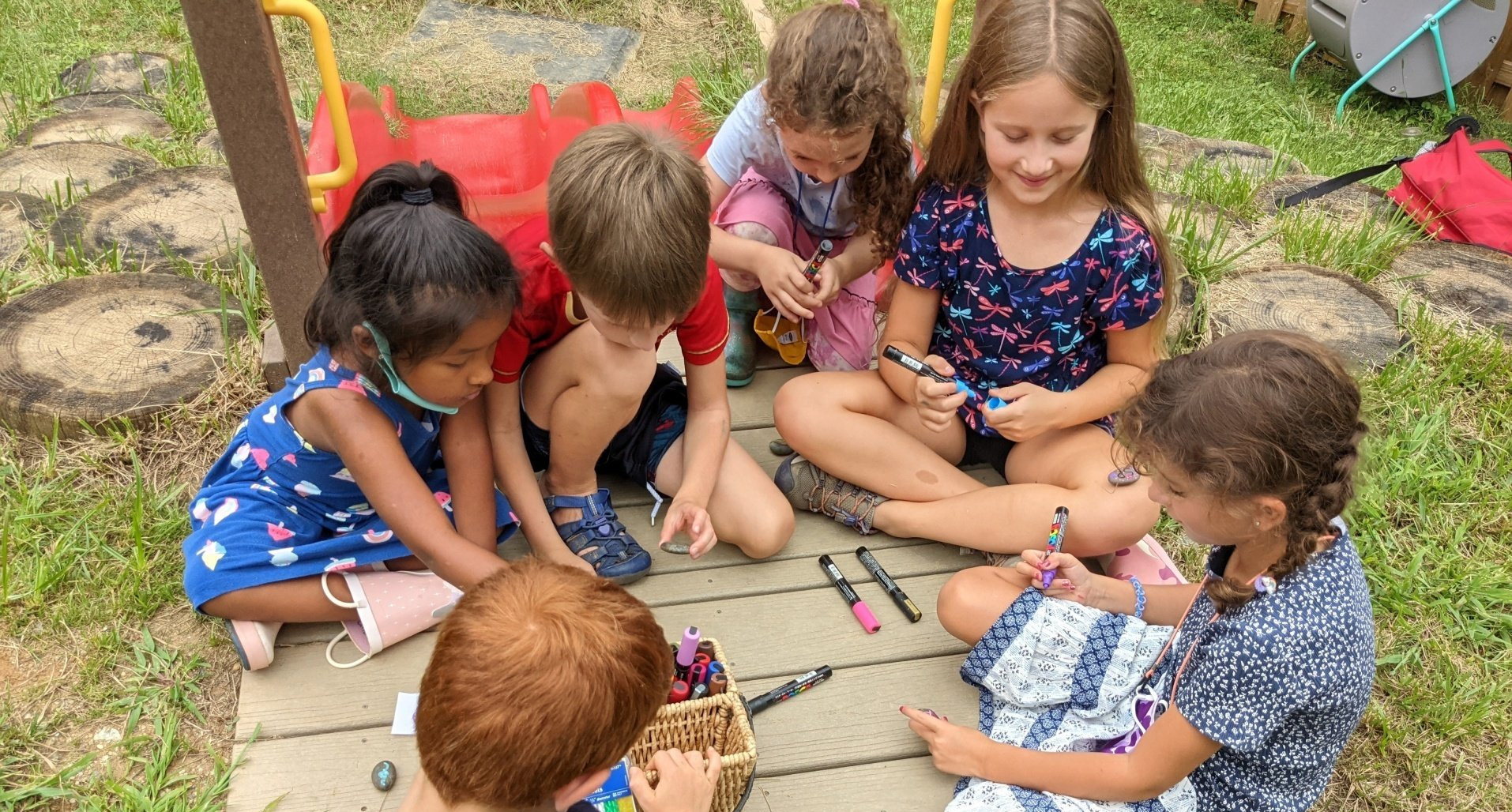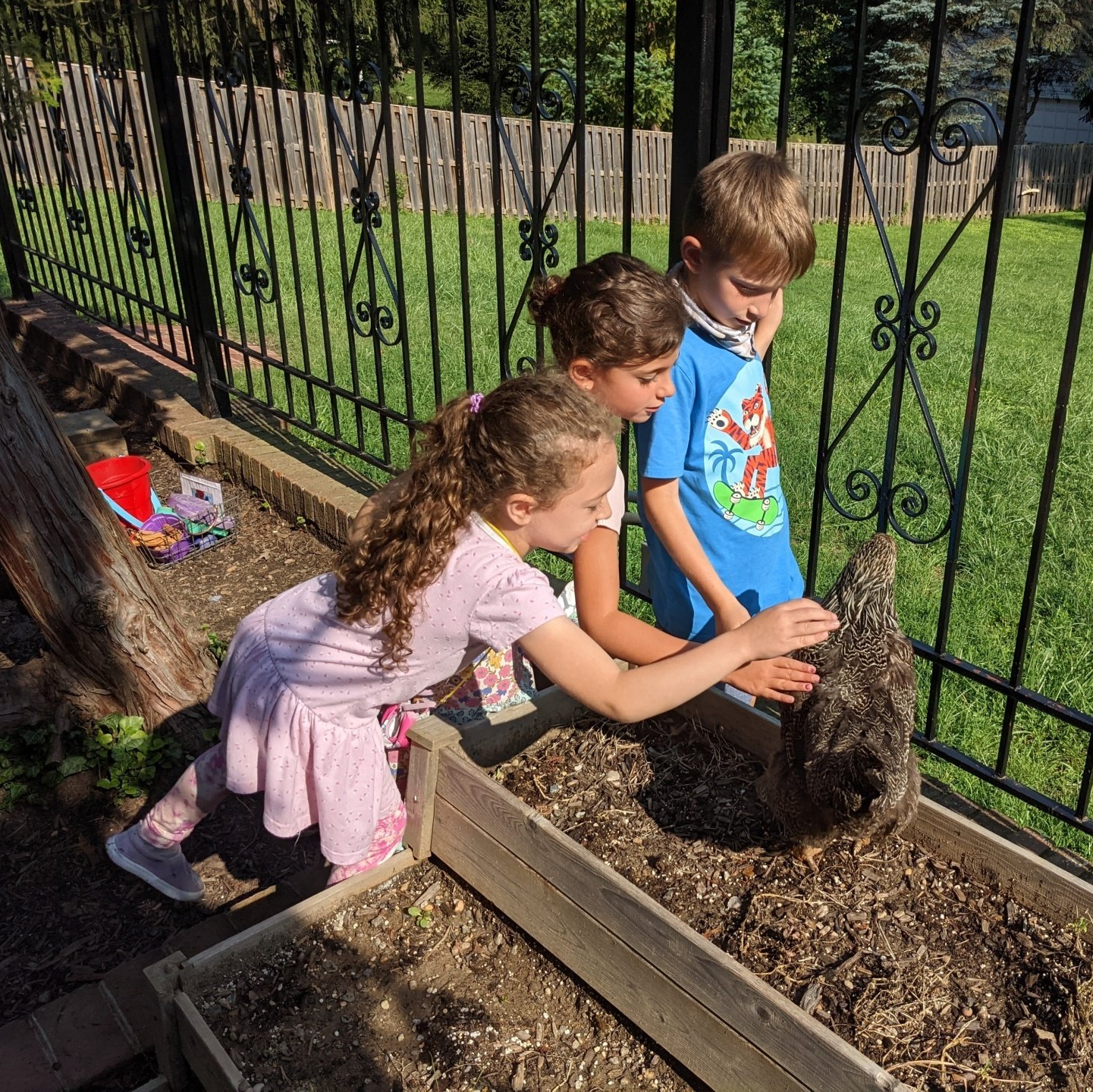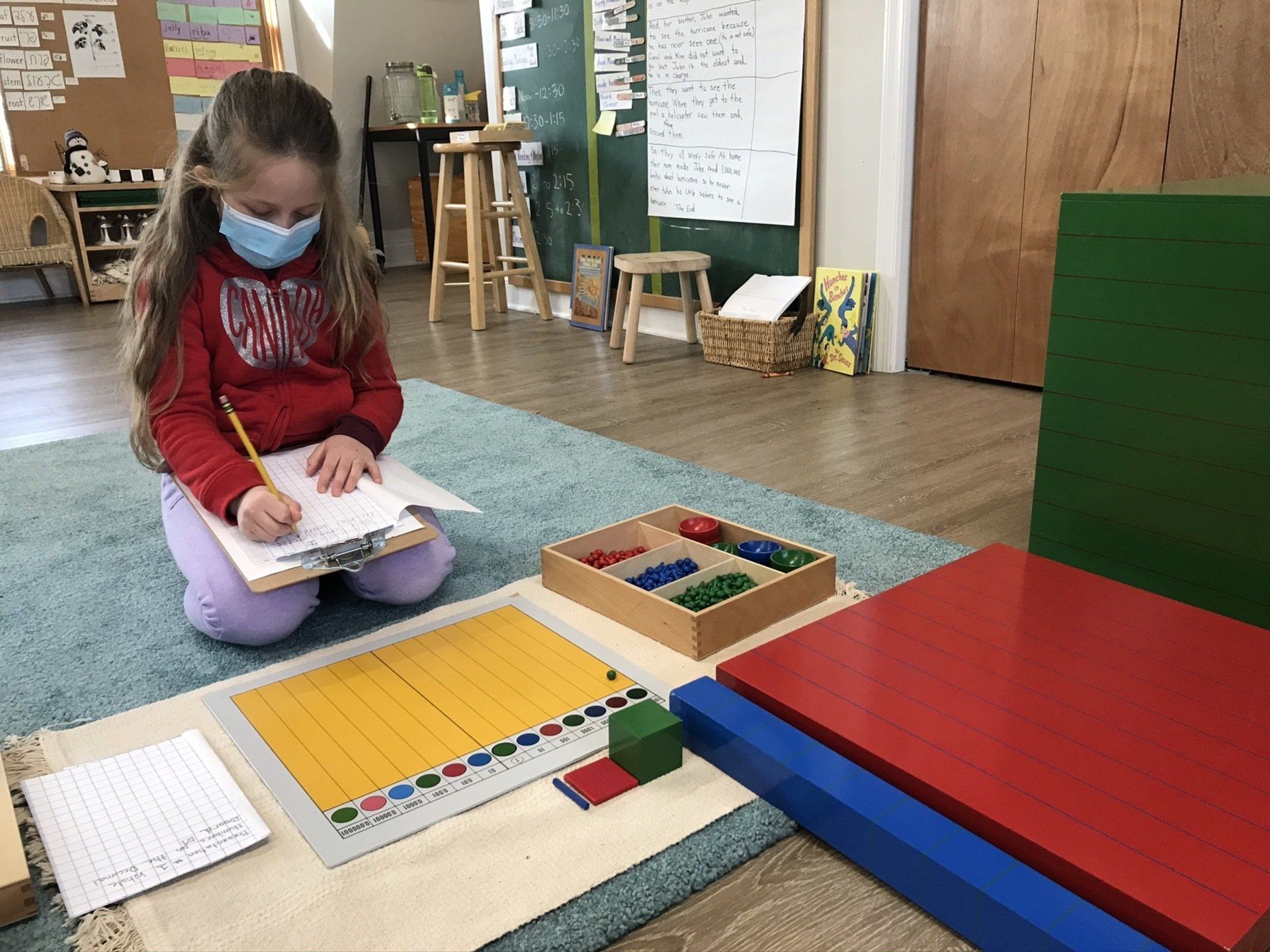Elementary
Learning How to Think
6 - 12 years
Children learning at the elementary level of multiple grade levels in one classroom. Children learn from older students and see those older students complete tasks that they will be doing themselves. Children often become mentors, helping their peers or younger friends with their “work”.
A Typical Day in the Elementary Classroom
A typical day in a Montessori class has a routine that the untrained eye, at first glance may not pick up on. Elements of that routine are: mixed aged students (grades first to sixth) working together, small group instruction, independent work, variety of activities happening throughout the work cycle, lots of movement among the children, and a quiet buzz of busyness. A feeling of grace and courtesy is present among the students and guides.
Our curriculum is adapted from Maria Montessori’s Cosmic Curriculum. The Cosmic Curriculum studies include natural and physical sciences, geometry, arithmetic, practical life, music, arts and crafts, language both Hebrew and English, Judaic religious studies, prehistory and history, and peace education. Using the Montessori instructional approach, the students at Alefbet Montessori receive impressionistic presentations that hook their emerging imagination. Then skills are introduced using concrete materials first, especially in mathematics and science, to aid our students in developing their reasoning mind.
Elementary Daily Schedule
8:30-8:45 Arrival. Being social is a hallmark of the elementary child, so arrival time is filled with greetings, shares, and a sense of celebration. Students check the Lesson Board, then plan their day’s work.
8:45-11:45 The Work Cycle. Maria Montessori observed that students can work uninterrupted for three hours - “Three Hours Cycle”. Within this time, there are ebbs and flows with movement, interaction, and noise. Students generally work without guidance unless scheduled for a lesson. Teachers plan these lessons for 2-4 students on relevant subjects, but others are encouraged to observe or participate if they want. Guiding principles in the classroom are trust and respect. Students are seen as capable problem solvers. Feedback is given, at minimum, during weekly student-goal meetings.
11:45-12:00 Morning Meeting and Prayer. Students practice the skills of attending a meeting: have poise, keep the focus on the meeting, and look at the speaker. They sing the Tefilla (prayers) and end with affirmations. Daily meetings are student-led.
12:00-1:30 Lunch and Recess. Another very social time for students. Students set and clean their tables. Lunch usually ends organically after about 25 minutes, followed by recess, which offers opportunities for learning social skills, boundaries, caring for others, and imaginary play.
1:30-2:30 Guided reading and Writing. Students receive direct instruction in reading and writing skills. Students read silently, with a partner, or in small-group lessons or work.
2:45 Dismissal. Students gather for a story and a cheerful goodbye. Our goal is to send them home with a feeling of satisfaction and high spirits after a good day of work.
Science & Nature
Our classroom lab helps children to go through the history and etymology of scientific subjects, including Astronomy, Earth Science, Chemistry and Physics. Students learn to observe nature, conduct basic experiments, gather data and record observations.
Practical Life
Everyday activities such as cooking, gardening and sewing are part of our practical-life work. We learn how to host, build a tent, and work with a campfire. Students have daily access to computers for research and writing, learning time management through opportunities to make autonomous choices throughout the day.
Language
We introduce affixes, synonyms, antonyms, possessives and contractions with hands-on materials. Daily language study also includes sentence analysis, grammar and syntax, composition, reading, reference and study skills, and listening and speaking skills.
Students learn about the history of language, with both instructional and self-teaching materials, allowing them to explore, memorize, and practice writing.
Hebrew reading and writing are also taught and reinforced through our specialty reading program.
“Morah Kimberly, the Elementary teacher, thank you for being a stable presence for the class. You are amazing.”
- Parent
Mathematics
Students study the decimal system, multiples and factors, geometry, fractions, powers and roots of numbers, measurement, statistics and graphs, pre-algebra and more.
They dive into the number systems of ancient civilizations and use learning aids to make abstract concepts more concrete in topics such as geometry and fractions.
Finally, students learn how to apply their skills practically to concepts such as money and cooking.
Geography
Lessons focus on the lithosphere, hydrosphere, atmosphere and biosphere. Students then apply these concepts to experiments and other related exercises.
Montessori-designed pin maps help students delve into the study of other countries. They learn about the interdependencies of societies by tracing the origin of food and the flow of goods to market, learning more in depth on topics relating to Israel and Judaism.
Art & Music
Dancing, singing and dramatic play are part of the classroom each day. Music is woven into classroom content, such as Mathematics and Judaic Studies.
We introduce new art materials such as watercolors, colored pencils, charcoal, tempera paint and modeling clay.
Judaics
We are dedicated to using Maria Montessori’s educational philosophy in our Jewish education. Hands-on cards, games, crafts and treasure boxes hold an abundance of materials for our students to discover.
Students learn the Chumash (Five Books of Moses) weekly, as well as the Parasha (weekly Torah portion), and the great 12th-century commentator Rashi. They also delve into a deep analysis of P’sukim (Biblical verses) as part of our curriculum. Daily Tefilla (prayer) starts our mornings, and stories about our nation and the history of the Jewish people are intertwined with the geography, language and history curricula.
If you think your child would thrive in a Montessori environment, give us a call or schedule a virtual tour online. We would love for you to visit our school and learn more.
OPENING HOURS
Elementary 8:15 - 3:00
Primary 8:15 - 3:00
Toddlers 8:30 - 2:45
After care - 4:00 (M, W, Th only)
PROGRAMS
Alef Bet Montessori School
Alef Bet Montessori School



